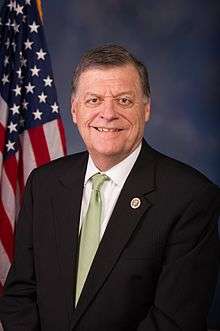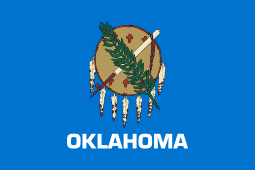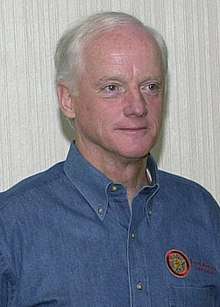Tom Cole
Thomas Jeffery Cole (born April 28, 1949) is the U.S. Representative for Oklahoma's 4th congressional district, serving since 2003. He is a member of the Republican Party serving as Deputy Minority Whip. The chairman of the National Republican Congressional Committee (NRCC) from 2006 to 2008, he was, during his tenure, the fourth-ranking Republican leader in the House. Cole – a member of the Chickasaw Nation – is one of only four registered Native Americans in Congress, the others being fellow Oklahoma Republican Markwayne Mullin and Democrats Sharice Davids of Kansas and Deb Haaland of New Mexico.
Tom Cole | |
|---|---|
 | |
| Ranking Member of the House Rules Committee | |
| Assumed office January 3, 2019 | |
| Preceded by | Jim McGovern |
| Member of the U.S. House of Representatives from Oklahoma's 4th district | |
| Assumed office January 3, 2003 | |
| Preceded by | J. C. Watts |
| 26th Secretary of State of Oklahoma | |
| In office January 9, 1995 – March 16, 1999 | |
| Governor | Frank Keating |
| Preceded by | Glo Henley |
| Succeeded by | Mike Hunter |
| Personal details | |
| Born | Thomas Jeffery Cole April 28, 1949 Shreveport, Louisiana, U.S. |
| Political party | Republican |
| Spouse(s) | Ellen Cole |
| Relations | Helen Cole (mother) |
| Children | 1 son |
| Education | Grinnell College (BA) Yale University (MA) University of Oklahoma (PhD) |
Early life, education, and educating career
Cole was born in Shreveport, Louisiana, the son of Helen Te Ata (née Gale) and John D. Cole.[1] He is a fifth-generation Oklahoman, having been raised in Moore, halfway between Oklahoma City and Norman. He graduated from Grinnell College in 1971 with a B.A. in history. His postgraduate degrees include an M.A. from Yale University (1974) and a Ph.D. from the University of Oklahoma (1984), both in British history. Cole's Ph.D. thesis was entitled Life and Labor in the Isle of Dogs: The Origins and Evolution of an East London Working-Class Community, 1800–1980. Cole did research abroad as a Thomas J. Watson Fellow and was a Fulbright Fellow (1977–78) at the University of London. He was a college professor in history and politics before becoming a politician.
Early political career
Following his mother Helen, who served as a state representative and senator, Cole served in the Oklahoma Senate from 1988 to 1991, resigning mid-term to become Executive Director of the National Republican Congressional Committee. From 1995 to 1999, he was Oklahoma's Secretary of State under Governor Frank Keating, and assisted with the recovery efforts following the 1995 Oklahoma City bombing. He resigned to become chief of staff to the Republican National Committee.[2][3] He also served as Chairman of the Oklahoma Republican Party for much of the 1980s.
Cole has been heavily involved in national politics as well, having served both as Executive Director of the NRCC and as Chief of Staff of the Republican National Committee (RNC).
Cole spent two years working as a paid consultant for the United States Chamber of Commerce, but his primary involvement in politics was as a political consultant for candidates. Along with partners Sharon Hargrave Caldwell and Deby Snodgrass, his firm (Cole, Hargrave, Snodgrass and Associates) played a large part in the reconstruction of Oklahoma's political landscape, and backed a number of candidates that took office during the Republican Revolution of 1994. Among their clients have been Keating, J.C. Watts, Tom Coburn, Frank Lucas, Mary Fallin, Wes Watkins, Steve Largent, former Mississippi congressman Chip Pickering, and Hawaii governor Linda Lingle.
U.S. House of Representatives
Elections
During his initial campaign for the House of Representatives in 2002, Cole received the endorsement of Watts, the popular outgoing congressman. This helped him win a hard-fought general election over Democratic nominee and former Oklahoma State Senator Darryl Roberts, taking 53.8 percent of the vote to Roberts' 46.1 percent. Cole has subsequently taken at least 63 percent of the vote in his eight reelection campaigns, and ran unopposed in 2010.
Tenure
Following the 2006 election cycle, the members of the House Republican Conference elected Cole to the post of NRCC Chairman, placing him in charge of national efforts to assist Republican candidates for Congress.
His voting record during his nine years in the House marks Cole as a solid conservative with occasional libertarian sympathies. He has consistently voted anti-abortion and pro-business positions, and established himself as a supporter of free trade, gun rights, the military, veterans, and American Indian issues. He favors loosening immigration restrictions and imposing stricter limits on campaign funds. In 2012, he sponsored H.R. 5912 which would prohibit public funds from being used for political party conventions. This legislation passed the House in September but awaits action by the Senate.[4]
In June 2013, after another failure of the United States farm bill in Congress, Cole called the failure of the legislation inexcusable. His district in Oklahoma includes some of the state's farming communities, and if the Farm Bill passed, it would have saved $40 billion over a ten-year period.[5]
As Chairman of the House Appropriations Subcommittee on the Legislative Branch, Cole was responsible for introducing the Legislative Branch Appropriations Act, 2015 (H.R. 4487; 113th Congress).[6] The bill would appropriate $3.3 billion to the legislative branch for FY 2015, which is approximately the same amount it received in FY 2014.[7] According to Cole, the bill meets its goals "in both an effective and efficient manner, and has done so in a genuinely bipartisan, inclusive and deliberative fashion."[8]
In 2013, Cole introduced the Home School Equity Act for Tax Relief. The bill would allow some homeschool parents to take tax credits for purchasing classroom materials.[9]
Cole expressed his intention in 2018 to push his Tribal Labor Sovereignty Act into the spending bill as an omnibus. The bill would "make clear that the National Labor Relations Board has no jurisdiction over businesses owned and operated by an Indian tribe and located on tribal land."[10]
Cole was ranked as the 91st most bipartisan member of the U.S. House of Representatives during the 114th United States Congress (and the most bipartisan member of the U.S. House of Representatives from Oklahoma) in the Bipartisan Index created by The Lugar Center and the McCourt School of Public Policy that ranks members of the United States Congress by their degree of bipartisanship (by measuring the frequency each member's bills attract co-sponsors from the opposite party and each member's co-sponsorship of bills by members of the opposite party).[11]
2016 House Speakership election
In the contest for House Speaker that followed the resignation of John Boehner Cole supported the claims of Paul Ryan:
"Anyone who attacks Paul Ryan as being insufficiently conservative is either woefully misinformed or maliciously destructive...Paul Ryan has played a major role in advancing the conservative cause and creating the Republican House majority. His critics are not true conservatives. They are radical populists who neither understand nor accept the institutions, procedures and traditions that are the basis of constitutional governance."[12]
Committee membership
As of the 115th United States Congress, Tom Cole is a member of the following U.S. House committees:
- Committee on Appropriations (Vice Ranking Member)
- Committee on the Budget
- Committee on Rules (Ranking Member)
Political positions
Cole supported President Donald Trump's 2017 executive order to impose a temporary ban on entry to the U.S. to citizens of seven Muslim-majority countries. He stated that "It is fair and appropriate to debate the merits of President Trump's executive order and its initial implementation. But it is inappropriate to engage in demagogic, inflammatory, inaccurate and reckless rhetoric that is designed to create and exploit a political issue rather than address a real threat to our security. I fear that is exactly what we are seeing from many of the President's critics."[13]
Electoral history
| Year | Republican | Votes | Pct | Democrat | Votes | Pct | 3rd Party | Party | Votes | Pct | ||||
|---|---|---|---|---|---|---|---|---|---|---|---|---|---|---|
| 2002 | Tom Cole | 106,452 | 53.83% | Darryl Roberts | 91,322 | 46.17% | ||||||||
| 2004 | Tom Cole | 198,985 | 77.77% | (no candidate) | Charlene K. Bradshaw | Independent | 56,869 | 22.23% | ||||||
| 2006 | Tom Cole | 118,266 | 64.61% | Hal Spake | 64,775 | 35.39% | ||||||||
| 2008 | Tom Cole | 180,080 | 66.02% | Blake Cummings | 79,674 | 29.21% | David E. Joyce | Independent | 13,027 | 4.78% | ||||
| 2010* | Tom Cole | 32,589 | 77.26% | (no candidate) | RJ Harris | Republican | 9,593 | 22.74% | ||||||
| 2012 | Tom Cole | 176,561 | 67.89% | Donna Marie Bebo | 71,155 | 27.60% | RJ Harris | Independent | 11,725 | 4.51% | ||||
| 2014 | Tom Cole | 117,721 | 70.80% | Bert Smith | 40,998 | 24.66% | Dennis B. Johnson | Independent | 7,549 | 4.54% | ||||
| 2016 | Tom Cole | 203,942 | 69.64% | Christina Owen | 76,308 | 26.08% | Sevier White | Libertarian | 12,548 | 4.28% | ||||
| 2018 | Tom Cole | 149,127 | 63.07% | Mary Brannon | 78,022 | 33.00% | Ruby Peters | Independent | 9,310 | 3.94% |
- In 2010, no Democrat or independent candidate filed to run in OK-4. The results printed here are from the Republican primary, where the election was decided.
Personal life
Cole and his wife, Ellen, have one son, Mason. He is a member of the United Methodist Church and lives in Moore.
Cole has said, "I was raised to think of myself as Native American and, most importantly, as Chickasaw."[15]
Cole has said that a great-aunt of his was the Native American storyteller Te Ata.[15] Describing his heritage, he said his "mother Helen Cole[16] was...extraordinarily proud of [their] Native American history and was, frankly, the first Native American woman ever elected to state senate in Oklahoma."[15]
Cole sits on the Smithsonian Institution Board of Regents and the National Fulbright Association.[17]
Cole is featured in the play Sliver of a Full Moon by Mary Kathryn Nagle for his role in the re-authorization of the Violence Against Women Act in 2013.[18]
References
- "cole". Freepages.genealogy.rootsweb.ancestry.com. Archived from the original on 2016-03-13. Retrieved 2015-10-27.
- Official Lands GOP Post Keating to Name New Secretary of State
- RNC picks new chief of staff
- "H.R. 5912: To amend the Internal Revenue Code of 1986 to prohibit the use of public funds for political party conventions". Retrieved 12 October 2012.
- Casteel, Chris (June 21, 2013). "Oklahoma Reps. Tom Cole, Jim Bridenstine Disagree on Farm Bill". NewsOK. Retrieved 20 July 2013.
- "H.R. 4487 – All Actions". United States Congress. Retrieved 2 May 2014.
- Marcos, Cristina (25 April 2014). "Next week:Appropriations season begins". The Hill. Retrieved 1 May 2014.
- Hess, Hannah (2 April 2014). "Legislative Branch Bill Keeps House Spending in Check". Roll Call. Retrieved 14 May 2014.
- Jim East, "Legislation would give home school families access to education tax deduction" Archived 2013-08-28 at Archive.today, The Ripon Advance, August 28, 2013. (Retrieved August 28, 2013)
- Wong, Scott. "Five things lawmakers want attached to the $1 trillion funding bill". The Hill. Retrieved 10 March 2018.
- The Lugar Center - McCourt School Bipartisan Index (PDF), The Lugar Center, March 7, 2016, retrieved April 30, 2017
- Steinhauer, Jennifer (12 October 2015). "Latest Unease on Right – Is Ryan Too Far to the Left?". New York Times. Retrieved 13 October 2015.
- Blake, Aaron. "Coffman, Gardner join Republicans against President Trump's travel ban; here's where the rest stand". Denver Post. Retrieved 30 January 2017.
- "Election Statistics". Office of the Clerk of the House of Representatives. Retrieved 2008-01-10.
- Native American Heritage Month Keynote Address (Speech). Library of Congress. 2007-11-06. Retrieved 2008-09-01.
- Helen Cole Archived 2010-05-31 at the Wayback Machine
- "Tom Cole Full Biography". Tom Cole U.S. Congressman. Retrieved 3 December 2014.
- "sliver of a full moon". sliver of a full moon. Retrieved 2016-12-12.
External links
| Wikimedia Commons has media related to Tom Cole. |
- Congressman Tom Cole official U.S. House site
- Tom Cole for Congress
- Tom Cole at Curlie
- Appearances on C-SPAN
- Biography at the Biographical Directory of the United States Congress
- Profile at Vote Smart
- Financial information (federal office) at the Federal Election Commission
- Legislation sponsored at the Library of Congress
- Biography and Videos – Chickasaw.TV
| Political offices | ||
|---|---|---|
| Preceded by Glo Henley |
Secretary of State of Oklahoma 1995–1999 |
Succeeded by Mike Hunter |
| U.S. House of Representatives | ||
| Preceded by J. C. Watts |
Member of the U.S. House of Representatives from Oklahoma's 4th congressional district 2003–present |
Incumbent |
| Preceded by Jim McGovern |
Ranking Member of the House Rules Committee 2019–present | |
| Party political offices | ||
| Preceded by Thomas Reynolds |
Chair of the National Republican Congressional Committee 2007–2009 |
Succeeded by Pete Sessions |
| U.S. order of precedence (ceremonial) | ||
| Preceded by John Carter |
United States Representatives by seniority 74th |
Succeeded by Mario Díaz-Balart |



